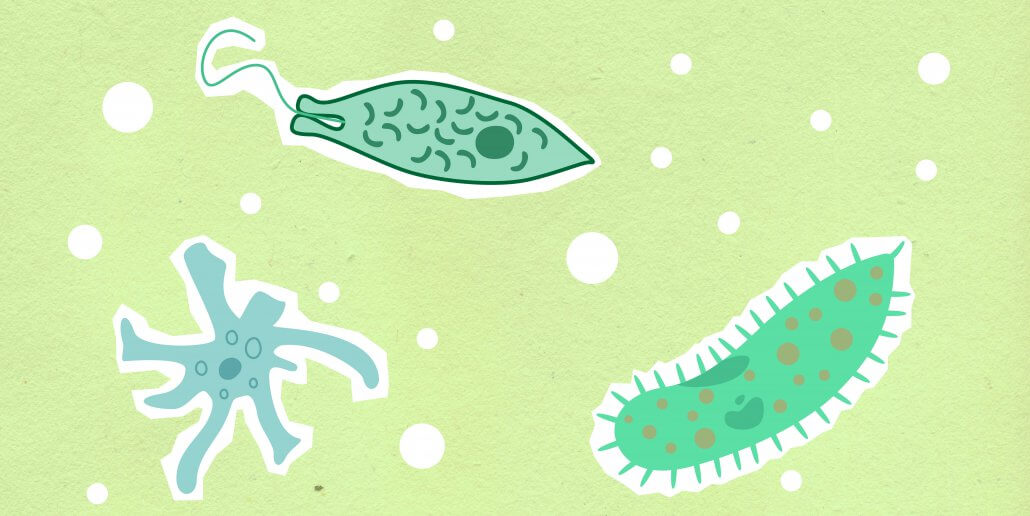Protozoa and protozoa tea
What are protozoa?
Protozoa are single-celled, colourless organisms. There is generally a population of 10 000 to 100 000 protozoa per gram of soil in the top layer of arable soil. They perform important roles and have several benefits to the soil. These include the cycling of nutrients and attracting earthworms.
Cycle nutrients
Protozoa are an important component in the cycling of nutrients (mainly nitrogen and phosphorus). The mechanism is through protozoa eating bacteria and releasing excess nutrients. Protozoa have a C:N requirement of 30:1 and bacteria have a C:N of 5:1. Therefore, for every 6 bacteria that a protozoa consumes, it releases the 5 units of nitrogen that it doesn’t need. Each protozoon consumes about 10 000 bacteria every day! This makes them a key player in making nitrogen available for plant absorption and use. Plus, nitrogen is excreted in the form of ammonium, which has been found to be a more efficient form for the uptake of nitrogen by plants. Ammonium also doesn’t leach from the soil as easily as nitrates do.
| The fate of nitrogen: nitrate-n vs ammonium-n
In a similar manner, through consuming and excreting, phosphate is cycled from microbial biomass. Second to mycorrhizal fungi, Protozoa are also important root zone architects. They cause an increase of branching on plant roots which allows the plant more access to minerals, including phosphorus.
If you do not have adequate balance between bacteria and the rest of the microbial community, nutrients get seized in the bodies of the bacteria, which the plants cannot access. Having a healthy population of protozoa helps to control bacteria populations. Creating a better balance between bacteria and microbial community results in higher organic matter breakdown and mineral cycling, as well as reducing the risk of harmful disease in plants.
Attract earthworms
Increasing the protozoa population of the soil will attract more earthworms. Protozoa are the main food source of earthworms. Earthworms will further improve the natural cycling of nutrients and promote soil health. Worm castings have been found to have up to 7 times more phosphorus than the surrounding soil, due to the earthworm’s increased ability to cycle nutrients. Earthworms play a key role in the formation of humus which can drastically improve the structure of the soil by promoting aggregation and improving the water holding capacity.
What is protozoa tea?
In simple terms, protozoa tea is a fermented solution of lucern, molasses and fish emulsion. The ferment is full of beneficial microbes, protozoa being the most abundant. Protozoa tea can be used to boost the protozoa population in your soil if there is a lack thereof or to improve the balance of microbes. Below is a recipe you can follow to make your own protozoa tea.
Make your own protozoa tea
The following instructions produce 1000l of protozoa tea
- Fill a 1000l tank with non-chlorinated water (non-chlorinated water includes rainwater or tap water that has been sitting in the tank for 24 hours before use).
- Shred, finely chop or mulch 20kg or 1 bale of fresh lucern that has not been treated with any chemical pesticides (pesticides will kill the protozoa).
- Place the shredded lucern in a compost tea bag with a rope and place it in the tank with water.
- Add 10l of molasses to the tank. This will feed beneficial bacteria.
- Add 20l of Seagro or liquid fish to the tank. This will feed beneficial fungi.
- Fit the tank with an aerator to aerate the mixture in the tank for 36 hours. When the ferment is ready, it should contain fine bubbles, creating aerobic conditions that are necessary for Protozoa to survive. If you leave it too long, an imbalance of microbes could occur. If you smell any foul odours from the mixture, then it has been left too long and needs to be thrown out because an imbalance of bacteria has occurred.
- The mixture needs to be used as soon as possible once it is ready (within a few hours) to prevent the beneficial microorganisms from dying out.
- The tea needs to be diluted at a ratio of 1:10 with water before applying. And the mixture can be sprayed with irrigation or applied directly to the soil with a sprayer. Spraying directly onto the soil will have the best, longest lasting effect, but do whichever is possible.
- Repeat the process and apply ferment once to two times a week for a few weeks to see the best results.
| Could compost tea be part of the solution
Conclusion
Protozoa are highly beneficial organisms in the soil because they control bacteria populations and help with nutrient cycling in the soil. Every farmer who wants to improve and enhance their soil health should focus on building an environment in the soil that creates habitats for balanced, healthy life (including protozoa).
As part of the journey to a balanced soil food web, you can make your own protozoa tea and apply it to your pasture or crops to inoculate the soil with protozoa and experience their benefits. Protozoa tea is not a silver bullet, but it is a tool that can be used in the pursuit of attaining a balanced soil ecosystem.
References
- https://biologicwine.co.za/2016/09/14/lucerne-tea-ferment/
- https://blog.nutri-tech.com.au/lucerne-tea/
- https://learn.eartheasy.com/articles/the-best-compost-tea-recipe-to-help-your-plants-thrive/
- https://www.agpath.com.au/wp/wp-content/uploads/2014/04/lucernetea.pdf
- https://www.futuredirections.org.au/wp-content/uploads/2017/06/Living-Soils-the-Role-of-Microorganisms-in-Soil-Health.pdf
- Protozoa and protozoa tea - 2021-04-07
- Green lacewings - 2021-03-01
- Understanding the black gold of the earth – humus. - 2021-02-02

